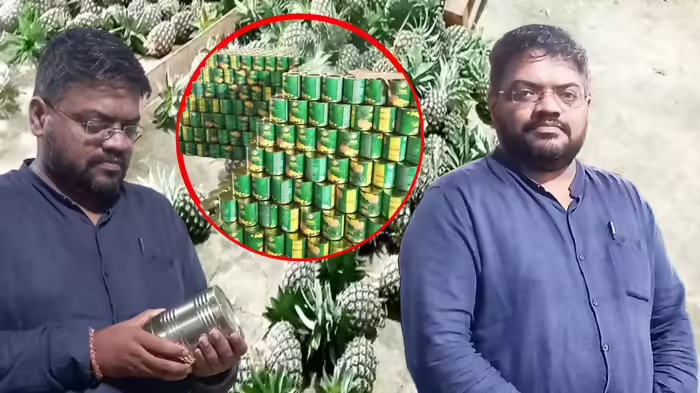
New Delhi: For Adwait Kulkarni, a mechanical engineer from Kolhapur, a simple holiday in 2017 turned into a life-changing entrepreneurial journey. What began as a vacation to Tripura soon became the foundation of a thriving food-processing business that today generates an annual turnover of ₹1.5 crore.
The Holiday That Sparked an Idea
In 2017, Adwait travelled to Tripura for a break — unaware that the state’s lush, endless pineapple plantations would redirect his life. Fascinated by the large-scale cultivation, unmatched sweetness, and low cost of Tripura’s pineapples, he began visiting repeatedly between 2017 and 2020.
He discovered a major gap: massive wastage of the produce due to the lack of processing units and poor logistics. The famed ‘Queen Pineapple’, which received a GI tag in 2015 and is Tripura’s state fruit, was being produced in abundance — often more than farmers could sell.
With inspiration from his father and technical support from a knowledgeable friend, Adwait decided to act. In 2021, he revived a defunct processing unit in Kumarghat and launched ‘Nansei Fruits & Vegetables Products Industry’, named after the fruit goddess of the local Darlong tribe. The company began producing canned pineapple slices.
Cutting Waste, Creating Prosperity
Kumarghat is among Tripura’s largest pineapple-producing belts, but until recently lacked any meaningful processing infrastructure. Adwait’s goal was clear: reduce wastage and ensure stable income for local farmers.
His unit began purchasing around 4,000 semi-ripe pineapples every day, creating a dependable sales channel for 60 farmers, more than 90% of whom belong to marginalised tribal communities. Farmers now earn ₹10–₹15 per fruit, gaining a steady and predictable income.
Inside the unit, 30 women workers handle peeling, slicing, and canning the pineapples with sugar syrup and citric acid — producing cans that stay fresh for up to two years. Today, the factory manufactures 70,000–75,000 cans per month, supplying major cities including Delhi, Kolkata, and Guwahati.
From Zero to ₹1.5 Crore – A Rapid Rise
Within just three years of operations, Nansei achieved a turnover of ₹1.5 crore in FY 2023–24. Adwait expects this to rise to ₹3 crore in the current fiscal.
The success comes from efficient use of two key pineapple varieties:
- Queen – ideal for juice
- Kew – best suited for canning
Challenges remain. Doing business in Tripura is not easy — raw materials such as citric acid must be sourced from Guwahati, while tin containers arrive from Delhi. Transporting goods over long distances adds to cost and time. Yet, despite these hurdles, Adwait has set a target of ₹8–10 crore annual revenue within a few years, supported by expansion into fruit and vegetable dehydration and ready-to-eat foods.
Expanding Beyond Pineapple
Adwait’s efforts have also transformed local agriculture. With help from expert farmers in Maharashtra, he partnered with Tripura’s agriculture department to introduce successful maize cultivation in the region. The government supported the initiative by providing seeds and soil-preparation assistance.
Today, maize is cultivated on 30–40 hectares, with 70% tribal farmers involved. The crop is harvested soon after paddy, giving farmers an additional income cycle. Nansei has also begun producing canned baby corn, and the company plans to take full responsibility for procurement under contract farming — including supplying seeds and technical guidance.
A Business That Changed a State
From saving thousands of pineapples from going to waste to empowering women and tribal farmers, Adwait Kulkarni has built far more than a business. He has helped create a sustainable agricultural ecosystem in Tripura — proving that sometimes, one holiday is enough to change not just a life, but an entire community.
Discover more from SD NEWS agency
Subscribe to get the latest posts sent to your email.
